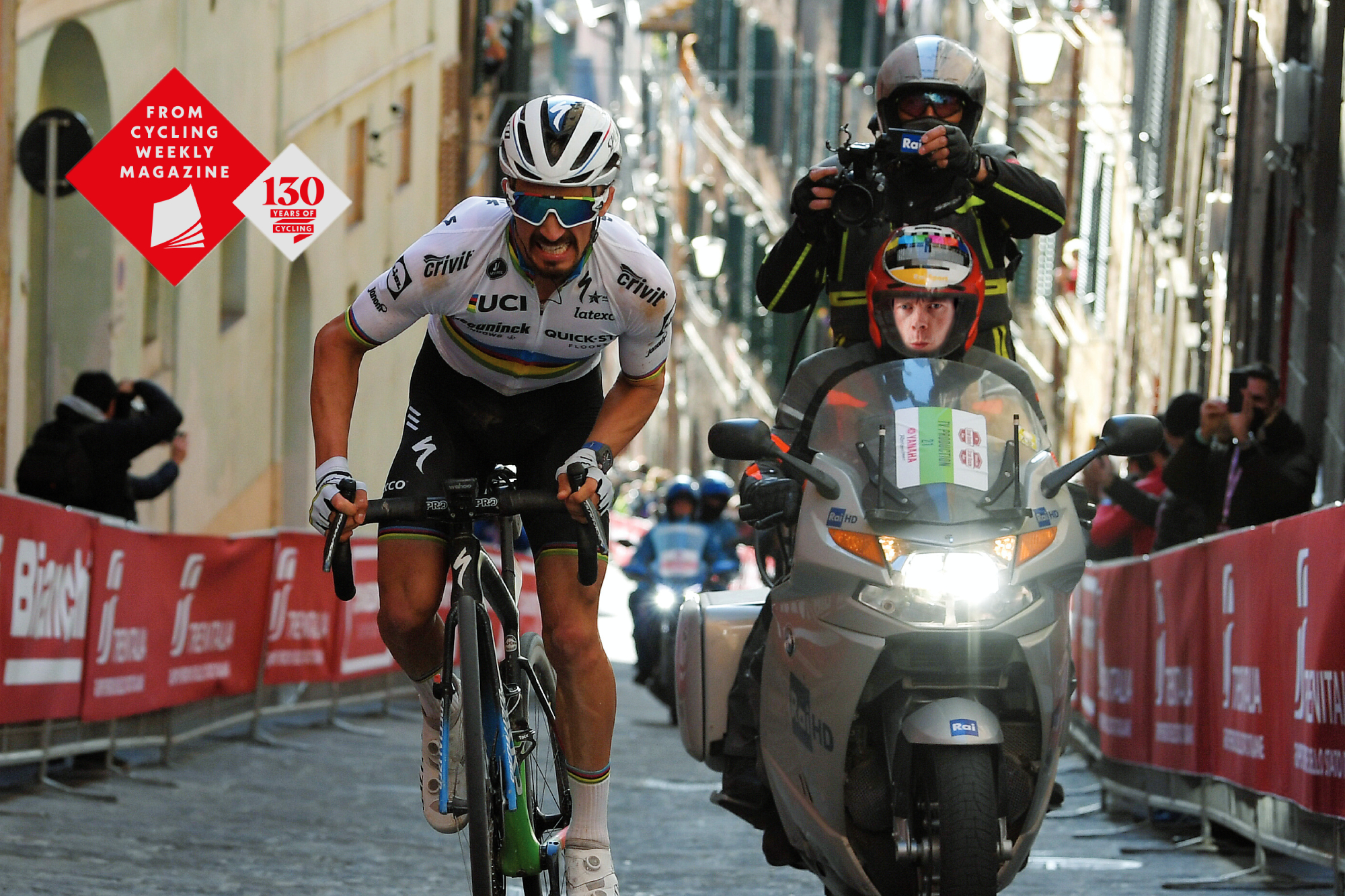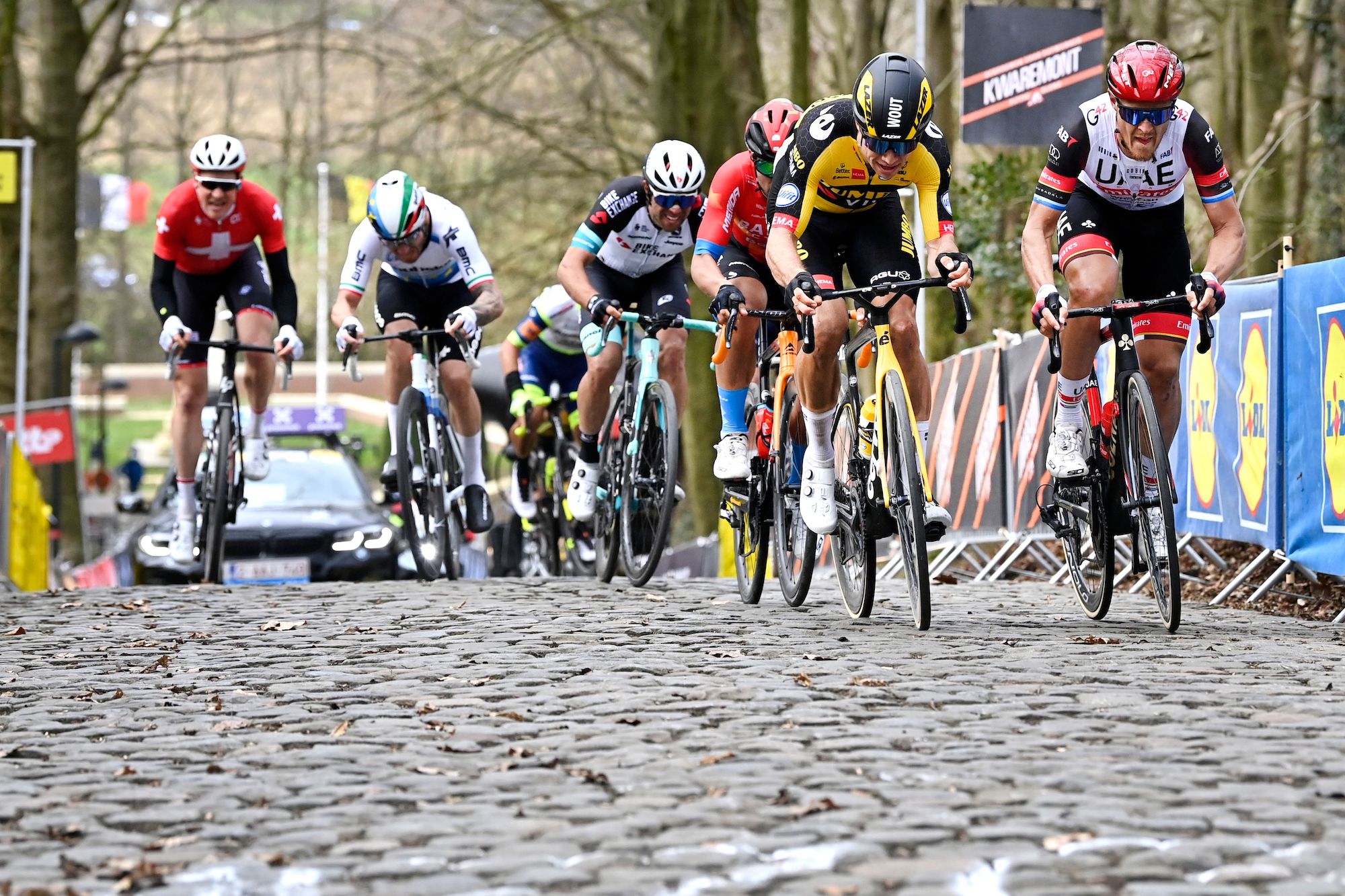Dr Hutch column: How to minimise the blow to your ego when you get dropped
It's as much about timing as any other cycling skill, muses the Doc

Julian Alaphilippe at Strade Bianche, followed by Hutch on a moto, of course (Getty)
The latest race content, interviews, features, reviews and expert buying guides, direct to your inbox!
You are now subscribed
Your newsletter sign-up was successful
The finish of the Strade Bianche race is always special – a stupidly steep hill, the narrow Siena streets, the way the winner bursts into the piazza with their arms already in the air. It’s always dramatic.
Especially, this year, for second-placed Julian Alaphilippe. Yes, yes, it was dramatic for Mathieu van der Poel as well, but he had the easy job – he just rode off for the win. Dropping someone is simple compared to being dropped. It’s one thing when a whole group gets dropped, because the inadequacy is collective. It’s quite another when it’s just two of you, and a few seconds later the lonely, defeated one of you.
What are you supposed to do when that sort of thing happens? Especially if you’re the current world champion?
You have to above all retain your dignity. Ideally, you want to give the impression that you got dropped because you were the stronger rider, but this isn’t very easy. So stop staring in horrified disbelief at the turn of events and do the “I love it when a plan comes together” face instead. You might, at a pinch, be able to disguise your problem as gifting the win to the other rider with a cheery wave and a theatrical sitting-up.
If it works, you look generous (if patronising), and your rival looks like the sort of rider who can’t win unless someone hands it to them. You might even be able to make it look so odd that they end up getting investigated on suspicion of bribing you.
But that only works very close to the finish. Earlier than that and your options narrow. Your only real hope is that the other rider has the jump to attack, but not the engine to stay away. So the big question is: when to let go? The further you hang on the bigger an anaerobic hole you dig and the more of a disaster it will be if it doesn’t work. Equally, if you let go sooner you’re in better shape, but even if your rival cracks further up the road, the chase will be longer.
The latest race content, interviews, features, reviews and expert buying guides, direct to your inbox!
My favoured method is to let them go early. If you’re sure the other rider has the jump on you it’s as likely to work as anything else, and (this is always my tie-breaker in any tactical decision) it’s a lot less sore on the old legs. Let go early enough and maybe everyone will forget you were ever there.
Ironically it’s much harder to deal with being dropped outside a race situation. There are two reasons for this. The first is that if you’re not in a race you’re never quite sure when the hostilities are going to break out. You can get quite a shock when after four hills of easy riding, the fifth turns into the Tour of Flanders.
The second is that there’s no finish line to work with. You can’t hatch a plan to catch up later, or pretend it was a gift – if you’re dropped, you’re dropped. The finish line is as soon as the other git is three lengths in front.
Outside a race also carries the danger of the aggravated drop. This is getting dropped by someone with mudguards, panniers, a toddler in a child seat.
Your only real option is to say that you weren’t playing. But that requires total dedication to the non-competitive approach. You have to be wilfully passive. The slightest swagger from you and you’re back in fight-club.
You might think all of this sounds like a terrible hassle. But look at it this way – if you’re not going to find ways to live with being dropped, you’re going to have to find ways of not being dropped in the first place. And that sounds like much harder work.
How to… ride like a Belgian

Belgium has probably produced the most distinctive style of road rider. For a start, a Belgian roadie tends to regard the road as only a rough guide to the day’s activities. Having been brought up in what is to all intents and purposes a traffic-calming theme park, a true Belgian would rather bunny-hop a kerb than ride round it, never misses a chance to swerve between roadside planters and prefers, if at all possible, to scare the living daylights out of spectators and passers-by by re-classifying the footway as a part of the race route.
Hills are to be attacked, preferably in a large gear. After all, they never last more than a few minutes. The rougher the road surface, the better. Ideally, for you, it will rain for all races. Your form will wilt badly should the temperature creep into double figures, but all the same, the leg and arm-warmers must remain in place until at least 90 per cent of German spectators have taken their shirts off.
You will enjoy cyclo-cross and campervans. Neither are optional. The ideal Belgian cyclist weekend is obviously taking the campervan to a cyclo-cross race in the rain.
To ride like a Belgian you need to thrive on the smell of chips mingling with the aroma of lager. Research to investigate whether the genetics of a Belgian mean that for them this combination is actually an ergogenic aid, has so far been inconclusive.
>>> Cycling Weekly is available on your Smart phone, tablet and desktop
Acts of Cycling Stupidity
I was once in a Cambridge University team time trial squad, riding the student champs. We took it quite seriously. In particular, two engineers and a mathematician devoted most of an afternoon to calculating the relative margins between the riders in the squad and finding the optimum riding strategy.
One of the riders was much, much stronger than the others. So the junior geniuses figured out a clear answer. The fastest way to ride was to leave the strong guy on the front for all 50km, and let the other three riders sit on his wheel, hopefully managing to hang on.
We collectively looked at this very well-proven bit of modelling and said, “Well, that can’t be right. Let’s all share it equally.”
It was the worst team time trial performance in living memory. It was a very, very embarrassing way to prove that while we couldn’t ride for toffee, our maths had been excellent.
Subscribers got to read all four of Dr Hutch’s columns last month…you can subscribe through this link here.
That way you’ll never miss an issue.
Jonny was Cycling Weekly's Weekend Editor until 2022.
I like writing offbeat features and eating too much bread when working out on the road at bike races.
Before joining Cycling Weekly I worked at The Tab and I've also written for Vice, Time Out, and worked freelance for The Telegraph (I know, but I needed the money at the time so let me live).
I also worked for ITV Cycling between 2011-2018 on their Tour de France and Vuelta a España coverage. Sometimes I'd be helping the producers make the programme and other times I'd be getting the lunches. Just in case you were wondering - Phil Liggett and Paul Sherwen had the same ham sandwich every day, it was great.